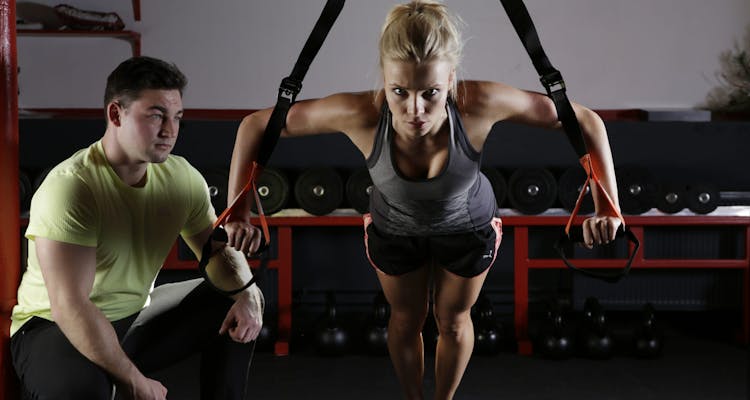Fitness instructors act as catalysts of transformation, channeling individuals toward a life teeming with boundless energy, resilience, and joy. If you are passionate about health and fitness and enjoy inspiring and motivating others to achieve their fitness goals, a career as a fitness instructor might be the perfect fit for you. Becoming a fitness instructor allows you to share your knowledge, expertise, and enthusiasm for fitness while positively impacting people’s lives.
Moreover, beyond the stereotypical boundaries of physical training, fitness instructors offer insights into lifestyle choices, sports psychology, weight management, and healthy food choices.
Embarking on a journey to become a fitness instructor is an admirable pursuit, driven by a passion for health and a desire to inspire others to adopt an active lifestyle. In this remarkable role, you can uplift individuals of diverse abilities and fitness levels, instilling a profound belief in their potential.
However, stepping into this role requires more than just a love for fitness. It demands in-depth knowledge, unyielding commitment, and effective communication skills. Today, we will explore some essential tips that will help you become a successful fitness instructor:
Contents
1. Pursue Higher Education
Fitness trends and scientific research are in a perpetual state of evolution. The use of technology has further catalyzed consistent modification in fitness activities. You must pursue higher education to thrive in this ever-changing and dynamic fitness world.
While workshops and seminars help you learn about various exercise and workout techniques, you need an advanced knowledge of biomechanics, exercise physiology, motor control, and sports psychology to thrive in this dynamic role. Therefore, consider enrolling in an online kinesiology bachelors degree or on-campus program offered by reputed universities. This degree provides a comprehensive understanding of how the human body functions during physical activity, exercise, and sports. Advanced knowledge of movement and biomechanics principles helps you analyze proper form, technique, and alignment during workouts. This knowledge enables you to teach correct movement patterns, prevent injuries, and optimize exercise performance. As you gain insights into exercise physiology, you can provide nutrition guidelines to increase endurance and tailor workouts to specific goals based on individual needs, such as cardiovascular endurance, muscular strength, or flexibility.
2. Research Your Options
Your career as a fitness instructor begins with a pivotal decision – determining the type of instructor you aspire to become. Contemplate the various paths available and envision the role that resonates most deeply within you. Would you thrive as a group fitness instructor, leading and inspiring small exercise classes? Or perhaps your ambitions align with personal training to satisfy your desire to engage deeply with clients individually. Or you may be drawn to the hybrid approach that blends group and individual training.
Once you have chosen your preferred training mode, consider the vast environments where your skills can flourish. Do you wish to train individuals and groups in a recreation center, a health club, or a small studio setting? Or do you want to become a virtual fitness instructor and leverage the power of technology to connect with individuals from the comfort of your home?
Discovering your possibilities will help you forecast the route you wish to pursue and build a roadmap to your desired career. Research all your options and allow your aspirations to guide you as you navigate the world of possibilities in fitness training.
3. Develop Expertise in Various Fitness Disciplines
Every trainer desires to be an expert in various fitness disciplines to become an effective fitness instructor. But before you become an expert in these disciplines, you must have a solid foundation through training programs, certifications, and courses.
Expand your knowledge in different areas such as aerobics, strength training, yoga, Pilates, or dance fitness. Gaining adequate experience and a solid educational foundation in diverse disciplines enhances your credibility. It enables you to design engaging workouts tailored to your client’s preferences, goals, and physiology.
4. Hone Your Communication Skills
Physical prowess alone is insufficient to position yourself above the ordinary and become an exceptional fitness instructor. It takes excellent communication skills to convey complex physiological concepts with simplicity and relatability and understand sport psychology. As a competent fitness instructor, you must develop the ability to explain complex terms, ideas, and concepts in a way your client can understand.
As a fitness instructor, your words carry immense power. Your words can ignite motivation and inspire action. The first step in building and honing exceptional communication skills is to develop active listening skills to understand your client’s needs and tailor your instructions accordingly.
Your ability to express yourself clearly and authentically sets the stage for an experience that resonates deeply with your clients. Through clear and effective communication, you will enhance your client’s overall experience and foster a motivational atmosphere within your classes.
5. Deliver Exceptional Customer Service
Your clients are your biggest asset. Treat them with utmost respect, kindness, care, and empathy, and make sure you’re always there for them. With exceptional customer service, you can create an environment where your clients feel valued, encouraged, and comforted. When you give your clients the highest priority, you pave the way for cultivating strong relationships and nurturing a positive experience for your clients, which translates into customer loyalty and fosters lasting connections.
6. Continuously Assess and Refine Your Training Style
Self-reflection constitutes an essential element for professional development as a fitness teacher. Continuously reviewing your teaching method and soliciting client feedback allows you to find areas for improvement and future development and helps you work on any performance gaps to enhance the outcomes of your lessons.
Adapt your teaching approach to accommodate various learning styles, and ensure your sessions are interesting and dynamic. Set a good example by being fit and following healthy practices yourself. Adopting a growth mentality and regularly honing your abilities can raise your instruction and improve your clients’ experience.
Final Thoughts
Being a fitness instructor is an extraordinary role demonstrating unwavering enthusiasm and an unyielding commitment to your client’s well-being. Following your dream of becoming an exceptional fitness instructor requires you to develop the expertise, communication skills, and passion necessary to guide and motivate others on their path to wellness. With the above tips, you can embark on your journey to becoming a fitness instructor and promise a future where your belief and dedication can pave the way for a world filled with boundless possibilities.






Comments are off this post!